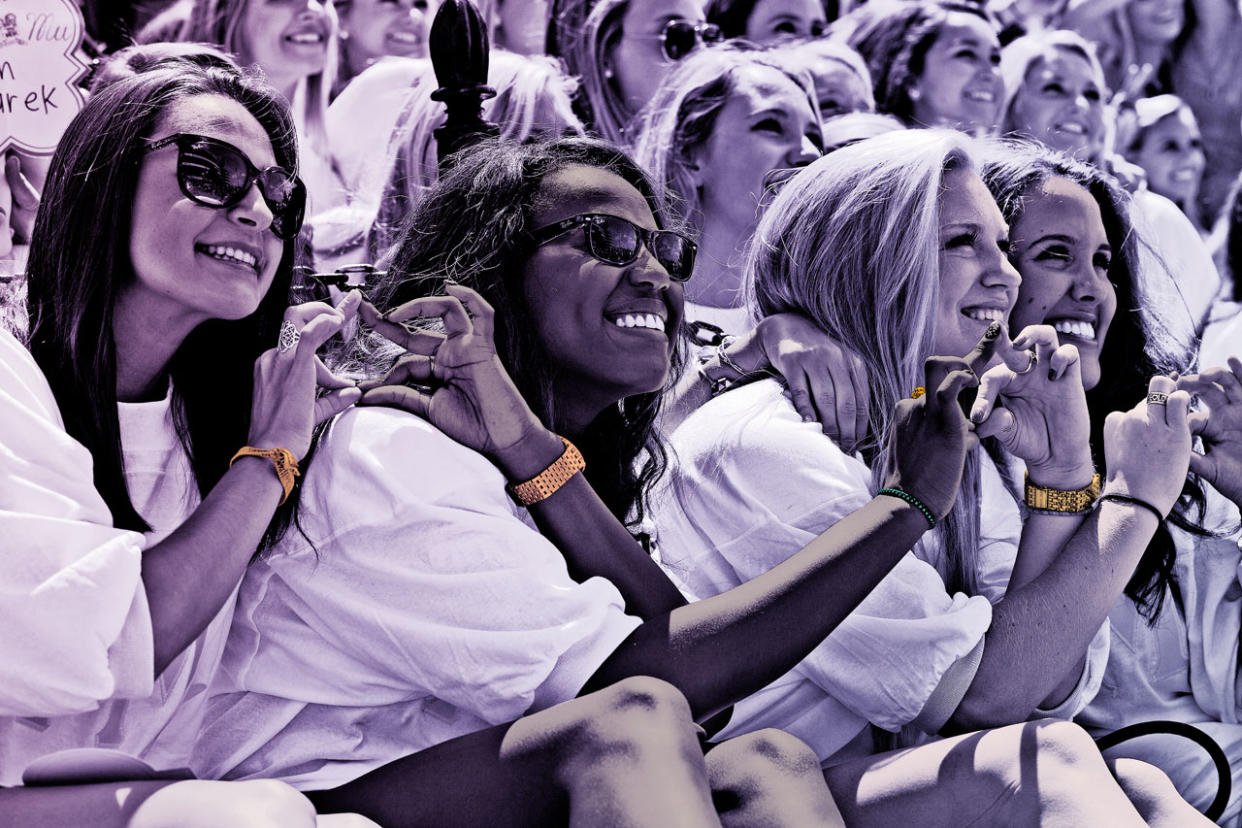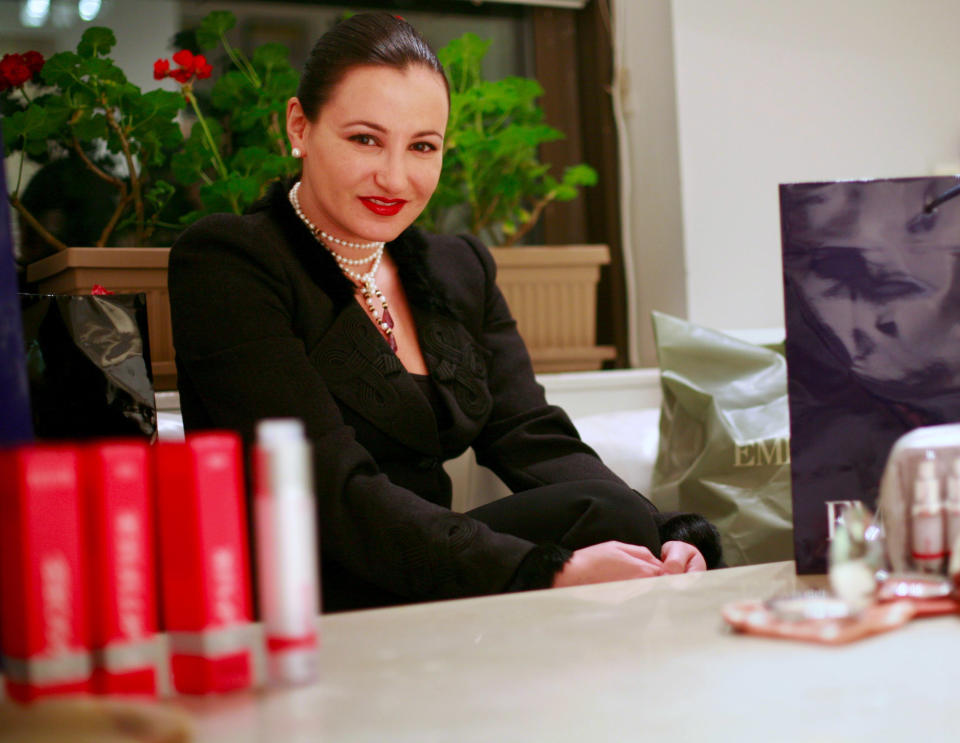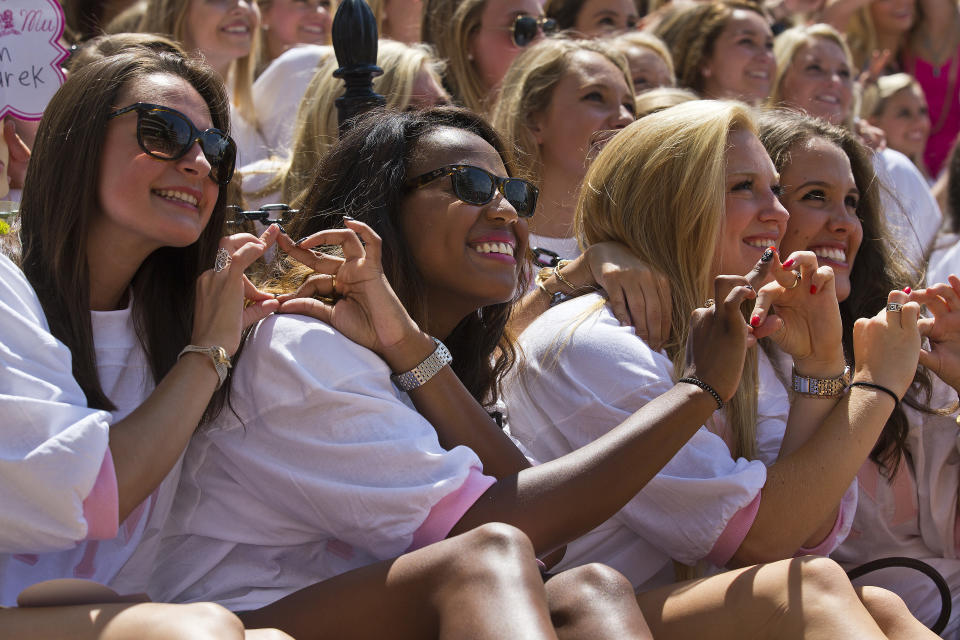Why girls are hiring sorority recruitment consultants: 'It's easy to not stand out'

Despite sororities across the country being exposed in recent years for abuses and bullying, they are still gaining in popularity. And gaining entrance has become so competitive, in fact, that young women are hiring professionals to help them stand out from the crowd of potential recruits. More than ever, these Gen Z students desperately want to win the approval of hardcore sorority gatekeepers, and are paying recruitment consultants, who coach girls through the rush process, to get a determined leg up.
Samantha von Sperling is an image consultant who’s been working with sorority potentials for about a decade. “Coaching young girls boosts their confidence and helps them feel prepared, empowered, and able to put their best foot forward,” she tells Yahoo Lifestyle.

Interestingly, von Sperling admits, “I don’t support sorority life.” So while she is fully invested in helping her clients gain admission if it’s what they want, she does help guide them with doses of realism. “I say, ‘Do you know what you’re in for? Do you know what they are going to do to you?’ And I ask them, ‘why do you want this? Because they are going to tear you apart, just so you know. Do you really want to put yourself through this?’ And, ‘Why would you want to go through this kind of process to be deemed worthy of friendship?’”
The consultant simply wants clients entering the process with eyes wide open, she says, wanting them to know “that they don’t have to turn themselves into somebody they’re not.” That way, von Sperling says, “no matter what happens, they come away with a feeling of self worth and confidence. I have taken them to the next level of becoming a swan in their development as a young lady.”
It could be said that such consultants, then, help young women dodge the know emotional pitfalls of sororities.
Madison Stephens, a recent University of Alabama grad, turned to a Rushbiddies, a Birmingham, Ala.–based firm, in part to avoid falling in with a cliquey house. “I had heard that sororities are really cliquey, so I was trying to find one that wasn’t like that,” she says. So Rushbiddies founder Pat Grant taught her what red flags to look for during recruitment.

“Pat taught me how to observe how the girls interact with each other in the house,” she tells Yahoo Lifestyle. “I went to this one party where I was talking to a sister who was telling me about her major, and then her big sister came over and said, ‘I’m the same major! We’re best friends! How did we not know we had the same major?!’ I was like, no,” Madison says, recalling her response to the lack of deep connection between the sisters. “It’s recruitment, everyone’s putting on their best face, so you have to be on the lookout for those little things that might call out who’s being fake.”
Still, girls like Stephens aren’t exactly shouting it from the rooftops when they’ve worked with a consultant — mainly because the practice still comes with a shroud of secrecy. “It’s a pride thing,” she explains. “No [potential recruit] wants to admit they needed extra help.” (Which is likely why she didn’t want to reveal the name of her sorority for this story.)
Recruitment consultancy Go Greek Girl touts, in particular, its ability to help young women find the right chapter for them. “If a woman is prepared, she can make an informed and educated decision about the chapter she is looking for on campus,” the firm’s Brooke Howard tells Yahoo Lifestyle. “GGG’s clients are prepared by our consultants in one-to-one or group consultations, so they know what to expect before and during recruitment. GGG’s consultants are available at each stage of recruitment and talk/Skype/text through questions, concerns, and issues that arise during the process as needed. The end result: GGG’s clients are present during the process, and find the chapter best suited for them.”
Those are steps taken by Rushbiddies, as well. “I always tell my clients not to go to frat parties without a sister or two. You stick together, and no one leaves without the other,” Grant, who is dedicated to helping prep girls for this “rite of passage,” tells Yahoo Lifestyle. “Be socially responsible and keep your moral compass in place. It is up to you to be aware of what situation you are walking into.” She insists the horror stories that leak out about bullying and belittling are the exception, not the rule, when it comes to Greek life. “Granted, there are horrible situations that get a lot of publicity, especially with fraternities. Those are not the norm. It is just that we hear about the bad stuff the most.”

More important to focus on, she and others say, are the age-old reasons to join a sorority: sisterhood, community, connections, and philanthropy.
“I can understand the coziness and feeling of having a safety network and a home away from home,” notes von Sperling, despite feeling on the fence about the whole culture. “And I can also really appreciate that sororities are behind community service and fundraising and civic duties, and keeping a GPA that’s on-point. And those are all excellent things,” she says. “And I think as women are transitioning from teenager to adult, having that support group of other likeminded women can be a very positive and powerful thing, and it can take a lot of the stress of college life off.”
Still, young women have been getting into sororities on their own for decades. Why the need for such assistance now?
“It’s just like people have been getting jobs and promotions and new positions for centuries without private coaching services,” von Sperling points out. “We all have our strengths and weaknesses. Whether you are pledging a sorority, going on a job interview or being considered for a promotion or campaigning for a position, many of the principles are the same. Lots of people get coaches in their lifetime at some point to hone skills of one kind or another.”
Not to mention that getting selected has become more competitive. “It’s more difficult because the sororities have so much more information at their disposal to review [such as social media],” says Sarah Cohen, senior associate director of fraternity/sorority life at Indiana University. She’s also a research associate at Dyad Strategies, a firm that gathers data for universities and organizations to “elevate the quality of their students’ experience,” and offers a program called Redefining Sisterhood. She thinks that the market for consultants came about in response to changes in recruitment.

“I believe it’s a combination of chapter size and legacy [children of pledges] status concerns,” she says. “Many national organizations no longer ‘require’ a chapter to accept a legacy, which means a legacy might attempt to work hard to ensure they get into their mother or sister’s organization. Additionally, as chapter and community sizes continue to grow, the process will get larger and larger and women may be using consultants as a way to stand out in the masses. Going through recruitment with over a thousand other women can be overwhelming, and might make people feel like they need to do something to get a leg up.”
She continues, “If you feel the only way to have a positive experience in college is to be in a sorority, it’s not surprising that people will go to extreme lengths.” Cohen sees several benefits to seeking professional help. “I always worry about the woman that shows up to campus with zero knowledge and concept of the Greek community and decides to join a sorority, and is at a disadvantage because she wasn’t coached.”
However, like anything, hiring a coach has its downsides, says Cohen. “I don’t love the concept… I worry that recruitment consultants detract from the ability to have genuine and honest conversations, because recruitment becomes more of a sales pitch than an opportunity to form connections and bonds.”
She says she believes that the purpose of joining a sorority is “to find a group of women that you get to experience college and adulthood with. They should be women that match your personality, and paying someone to coach you on the appropriate tactics to get an invitation to a chapter goes against the very nature of finding your fit.” Further, Cohen explains. “The idea of consultants plays into the notion that the process is difficult or confusing to navigate, when in reality, it should be the most natural process to find your home away from home with a community of women.” Plus, she adds, there are already recruitment counselors, student leaders, and other on-campus helpers to “assist while still still maintaining a level playing field.”
Which brings us to the issue of economic disparity, and who can actually afford to pay for a leg up with a consultant. Von Sperling’s fees, for example, start at $300 an hour, with the option of paying $3,000 for an intensive 10-hour day. The work is done privately, either in person or via FaceTime.
But for Stephens, the recent University of Alabama grad, an outside consultant felt like the only way to go. And luckily, her family could afford to hire one. “My mom was the one who found Pat,” she explains. “It’s really helpful if you know someone, or if you’re a legacy, or just have any kind of connection. I didn’t have any legacy or connection; my mom didn’t go through this, either. So when she found Pat, it was really helpful learning things like how to get letters of recommendation.”
She adds, “With the amount of girls going through recruitment, it’s easy to not stand out. Consultants are a great way to make sure you don’t fall through the cracks.”
Read more from Yahoo Lifestyle:
March for Our Lives and gay activism: ‘They’re definitely linked for me,’ says Emma González
The most pressing question of Women’s History Month: What is feminism in 2018?
Follow us on Instagram, Facebook, and Twitter for nonstop inspiration delivered fresh to your feed, every day.
